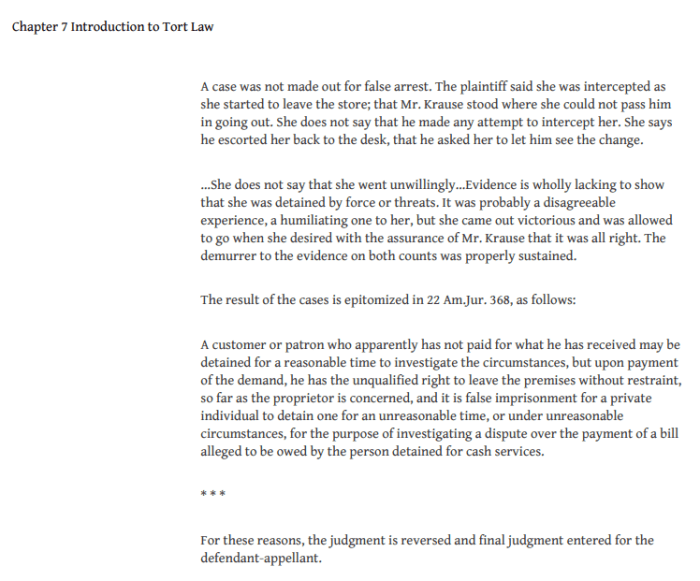In the realm of employee privacy, the landmark case of Lester v. Albers Super Markets has established a pivotal legal framework that continues to shape workplace practices today. This case has profoundly impacted the understanding of employers’ obligations and employees’ rights regarding privacy in the workplace, paving the way for a more balanced and respectful work environment.
This comprehensive overview delves into the intricacies of Lester v. Albers Super Markets, examining its legal precedents, employer obligations, employee rights, technological advancements, and best practices. By exploring these facets, we aim to provide a thorough understanding of this seminal case and its enduring implications for workplace privacy.
Legal Precedents

The landmark decision of Lester v. Albers Super Markets, Inc. established significant legal principles that have shaped the legal landscape regarding employee privacy in the United States.
One of the key principles established in the ruling is the “reasonable expectation of privacy” standard. This standard requires employers to demonstrate that they have a legitimate business reason for conducting searches or surveillance of employees and that the scope of the search is reasonable in light of the privacy interests at stake.
Lester v. Albers Super Markets, a case involving a slip-and-fall accident, has been making headlines. However, it’s important to note that the injuries sustained in such accidents can be severe, including cleft lip. Cleft lip, a birth defect, can be caused by factors such as the use of certain bottles, as discussed in Mead Johnson Bottle Cleft Lip . As such, it’s crucial to consider the potential risks associated with any products used by infants.
Impact on Subsequent Cases
The ruling in Lester v. Albers Super Markets, Inc. has had a profound impact on subsequent court cases involving employee privacy. The “reasonable expectation of privacy” standard has been widely adopted by courts across the country and has served as a benchmark for determining the legality of employer searches and surveillance.
The decision has also influenced the development of other legal doctrines, such as the “intrusion upon seclusion” tort, which provides a civil remedy for individuals whose privacy has been violated.
Employer Obligations

Following the precedent set in Lester v. Albers Super Markets, Inc., employers have a legal obligation to protect the privacy of their employees. This obligation stems from the court’s recognition that employees have a reasonable expectation of privacy in their personal information, including medical records and other sensitive data.
To comply with this obligation, employers should take the following specific actions:
Confidentiality of Employee Information
- Establish clear policies and procedures for handling employee information, including medical records, financial data, and other sensitive information.
- Limit access to employee information to only those who have a legitimate business need to know.
- Train employees on the importance of maintaining the confidentiality of employee information.
- Implement physical and electronic security measures to protect employee information from unauthorized access, use, or disclosure.
Employee Access to Information
- Provide employees with access to their own personnel files and other relevant information upon request.
- Allow employees to correct or amend inaccurate or incomplete information in their personnel files.
- Respond to employee requests for information in a timely and reasonable manner.
Consent for Disclosure
- Obtain the employee’s consent before disclosing any personal information to third parties, unless required by law or court order.
- Limit the disclosure of employee information to only what is necessary for the specific purpose for which it is being disclosed.
- Document the employee’s consent and the purpose of the disclosure.
By taking these steps, employers can help to protect the privacy of their employees and comply with their legal obligations under Lester v. Albers Super Markets, Inc.
Employee Rights: Lester V. Albers Super Markets

Employees have the right to privacy in the workplace, which includes the right to be free from unreasonable searches and seizures of their personal belongings, as well as the right to have their personal information kept confidential.
However, there are some limitations on employee privacy in certain circumstances. For example, employers may be able to search an employee’s belongings if they have a reasonable suspicion that the employee is engaging in illegal activity. Employers may also be able to disclose an employee’s personal information to third parties if required to do so by law.
Searches of Employee Belongings
The Fourth Amendment to the U.S. Constitution protects individuals from unreasonable searches and seizures. This protection applies to employees in the workplace, which means that employers cannot search an employee’s belongings without a reasonable suspicion that the employee is engaging in illegal activity.
If an employer has a reasonable suspicion that an employee is engaging in illegal activity, the employer may search the employee’s belongings. However, the search must be conducted in a reasonable manner. For example, the employer cannot search the employee’s belongings in a way that is overly intrusive or humiliating.
Disclosure of Employee Personal Information
Employers have a duty to keep employee personal information confidential. This includes information such as an employee’s Social Security number, address, and phone number. Employers may only disclose this information to third parties if required to do so by law.
For example, employers may be required to disclose employee personal information to the government for tax purposes. Employers may also be required to disclose employee personal information to a court of law if subpoenaed.
Technological Advancements

Technological advancements have profoundly impacted employee privacy in the workplace. From the use of surveillance cameras to GPS tracking, employers have access to a vast array of tools that can monitor employee activities.
This has raised concerns about the potential for employers to invade employee privacy and collect data that could be used to discriminate or retaliate against them. Employers must carefully balance the use of technology with the privacy concerns of their employees.
Employee Monitoring
- Employers may use technology to monitor employee activities, such as email, internet usage, and computer keystrokes.
- This monitoring can help employers to improve productivity and prevent misconduct, but it also raises privacy concerns.
- Employers must have a legitimate business reason for monitoring employees and must provide notice to employees that they are being monitored.
GPS Tracking
- Employers may use GPS tracking to monitor the location of their employees.
- This can be used to track employee movements during work hours and to ensure that employees are not engaging in unauthorized activities.
- However, GPS tracking can also be used to monitor employees outside of work hours, which raises privacy concerns.
Social Media Monitoring
- Employers may monitor employees’ social media activity to assess their suitability for employment or to investigate misconduct.
- However, employers must be careful not to violate employees’ privacy rights when doing so.
- Employers should have a clear social media policy that Artikels the circumstances under which they may monitor employees’ social media activity.
Best Practices

Implementing effective privacy practices in the workplace is crucial for protecting employee privacy while maintaining a productive work environment. Employers can establish a culture of respect and trust by adopting the following best practices:
Develop and communicate a comprehensive privacy policy that clearly Artikels the company’s privacy expectations, including the collection, use, and disclosure of employee data.
Employee Privacy Training
Provide regular training to employees on the importance of privacy, their rights and responsibilities, and the company’s privacy policies and procedures.
Privacy Impact Assessments
Conduct privacy impact assessments before implementing new technologies or processes that may affect employee privacy.
Data Minimization
Collect and retain only the data necessary for legitimate business purposes and for the minimum amount of time required.
Secure Data Storage
Implement appropriate security measures to protect employee data from unauthorized access, use, or disclosure.
Employee Access and Consent, Lester v. albers super markets
Provide employees with reasonable access to their personal data and obtain their informed consent before collecting or using their data for specific purposes.
Employee Grievance Process
Establish a clear and accessible grievance process for employees to report privacy concerns or violations.
Examples of Effective Privacy Policies
The following examples illustrate effective privacy policies that protect employee privacy while enabling a productive work environment:
- Google’s Privacy Policy: https://policies.google.com/privacy?hl=en-US
- Microsoft’s Privacy Statement: https://privacy.microsoft.com/en-us/privacystatement
- IBM’s Privacy Policy: https://www.ibm.com/privacy/details/us/en/
Commonly Asked Questions
What is the significance of Lester v. Albers Super Markets?
Lester v. Albers Super Markets established legal principles that define employer obligations and employee rights regarding privacy in the workplace, serving as a foundation for subsequent court cases.
What are the key employer obligations under Lester v. Albers Super Markets?
Employers have a duty to protect employee privacy by taking reasonable steps to prevent unauthorized access, use, or disclosure of personal information.
What rights do employees have regarding privacy in the workplace?
Employees have the right to privacy in their personal communications, medical records, and other sensitive information, subject to certain limitations.